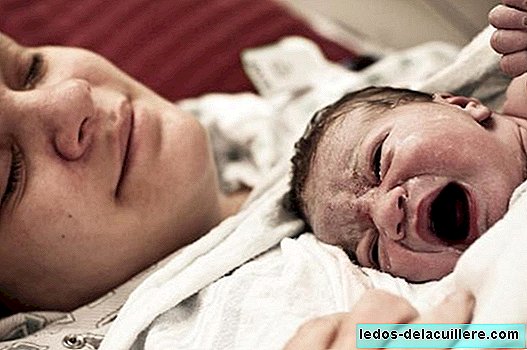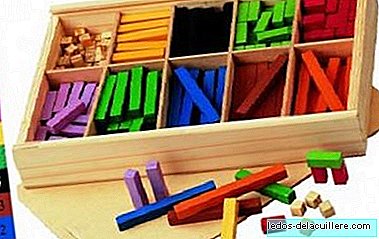When our baby is born, after a good time with mom, with whom she makes her first shot, it is measured and heavy to have a reference what will be its evolution
It is well known that the usual starting from that moment is to start losing weight. It sounds dangerous, it sounds like a mistake that needs to be solved, but it is something almost inevitable and normal that is soon solved (if all goes well).
However, weight loss has a limit and we must be careful that the situation is reversed, so today we will try to answer two questions about it: Why do babies lose weight and how much can they lose?
Why do they lose weight?
There are three main reasons why babies, despite being fed on demand since birth, lose weight:
- The expulsion of the meconium: After a few hours after the babies are born, they expel their first poop, the meconium, a viscous, dark, sticky substance, and I could even say that it is difficult to clean, as a result of everything the baby has been swallowing during pregnancy. Actually, the following poops will also be of a similar appearance, so it is estimated that the baby comes with 90 grams of meconium in his intestines that of course, by eliminating them, make the baby lose weight.
- Babies also urinate: you are right. They not only poop, but also pee, and not only once, but several times a day. Through urine, and perhaps through sweat, they lose fluid and weight.
- They still eat little: In mom's womb she received "food" constantly through the umbilical cord, but once it is born it ends. The baby is consuming energy just for the sake of living. Even if you barely move, even if you sleep, your body needs energy, and at first you don't eat too much. If the baby is breastfed, he will be taking colostrum, which is a very important substance for the baby because of its composition, but that comes in small quantities. It is not an error, it must be like that. The baby's stomach is receiving food for the first time and at the time of birth it begins to colonize with the flora it receives in its first contacts with the outside and that will help it digest what it eats. At first have to eat little (but on demand, nature already takes care of it). If you are drinking artificial milk you will not have colostrum, but the norm is the same: a newborn cannot take more than 10 ml per dose the first day, so it won't be enough to prevent weight loss.
How much weight do they lose?

This is a difficult question to answer, because some lose very little and others lose a lot. There is no single answer, so we have to talk about a range, a percentage of weight that is considered normal. The problem is that it is not yet known how much that percentage is.
It is often said that Normally, they lose between 5% and 7% of the newborn's weight, accepting a maximum limit of 10% (if born with 3,200 kg, which loses 320 grams). Something like "at the time it reaches 7% we must pay special attention to prevent it from reaching 10%. If it reaches 10%, we have not been able to solve it." That is, we should try not to reach that 10%, because if we arrive then you have to run. Come on, solve it yes or yes. We can not do tests and find that once again weighing it has already reached 11% or 12%.
Why do I say that it is not clear what that percentage is? Well, because recently there has been a new review of studies on this subject and it cannot be said that the conclusion is clear. I speak of an analysis of studies in which the weight of babies born at term, healthy and fed exclusively with breast milk is assessed.
In this review they saw that the average weight loss of these babies it varied between 3.79% and 8.6%, and that the point at which most children had lost the greatest weight occurred between 2 and 4 days after birth. From that moment they began to gain weight.
However, they evidenced significant methodological defects in research: gaps in data collection, lack of documentation of the type of feeding of babies, insufficient sample of babies fed exclusively with breastfeeding, babies who lost more weight than left the study, etc., and concluded that well-designed clinical studies that address these limitations are needed.
Come on, that new well-conducted studies could yield different figures and that is why, in the absence of more reliable information, we will continue to move in the figures we have commented. A maximum loss of 7-8% and from that moment, assess very well the way forward to try not to exceed the limit, the red line, which means losing 10% of the weight.
Act? Give a bottle?
To act is to make an assessment and follow-up urgently and conscientiously. Assess the shot to see if there is a position problem (bad position, breast pain, cracks in the mother, nipple that is deformed after the shot, etc.). See how the baby sucks, what does he do, if he falls asleep right away, if after falling asleep immediately he asks again crying or rests for a while, if he is pooping, what color the poop is, if the baby has a sublingual bridle or retrognathia, if the mother may have a hormonal problem that is affecting her production, if she is giving it on demand, frequently, if the delivery went well, if she had any bleeding, if it was by caesarean section and there was separation, if she has been given a pacifier, if you have been given a bottle, yes ...
And based on all that data, act. Promoting perhaps the extraction of milk to increase production and supplement the baby with syringe (finger-syringe), perhaps giving artificial milk, also with syringe, to avoid losing weight while looking for solutions, etc. What it takes to get that the baby gains weight while helping the mother to breastfeed, if it is what you want.












